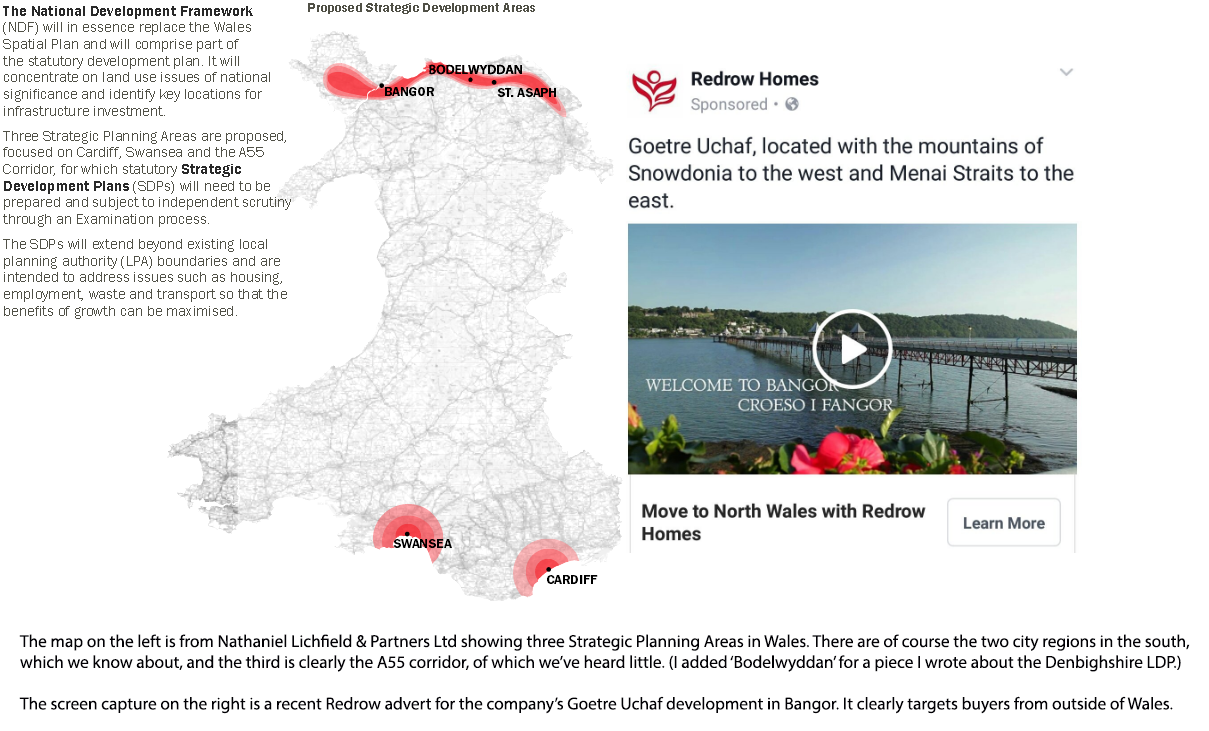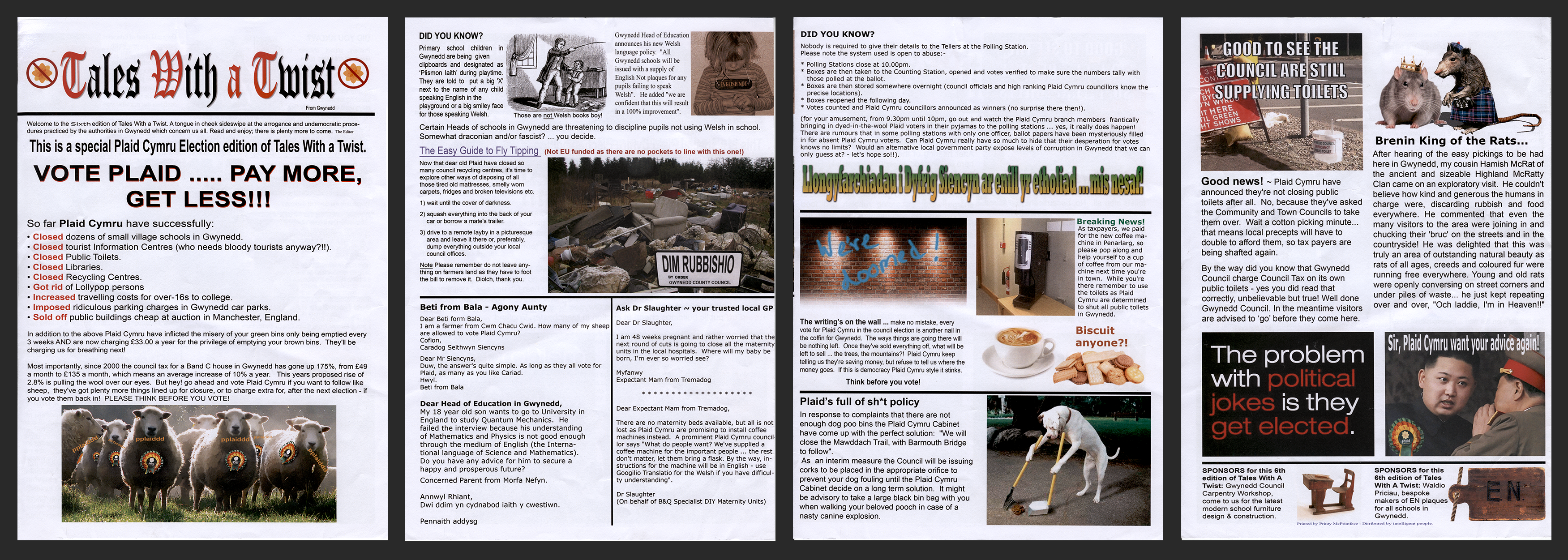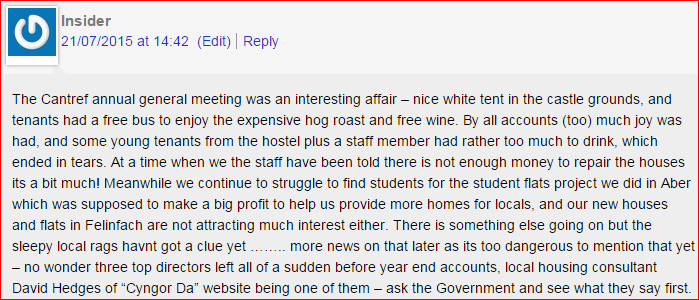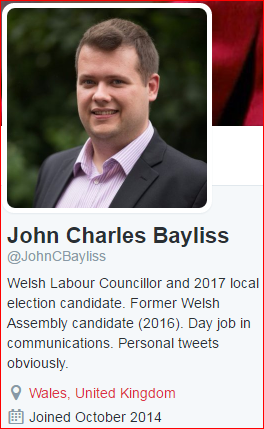TWENTY YEARS ON
We are currently celebrating the twentieth anniversary of the referendum that gave us devolution. Ron Davies described it at the time as “a process not an event”, but little if any progress has been made.
In yesterday’s Llais y Sais Ron Davies was allowed to explain why he thinks devolution has failed to deliver, why it has not improved the lives of Welsh people. This seems to have been a print version of what he said the day before on radio (06:00) and television (15:26).
Llais y Sais allowed Carwyn Jones to respond, and his response was pathetic; hiding behind the shade of Rhodri Morgan and talking of increased powers rather than addressing the point raised by Ron Davies, which was that Wales is worse off today – in terms of wealth, health, education and other indices – than she was 20 years ago ergo devolution has failed to deliver. Few outside the Bay Bubble would disagree with Ron Davies.
But lurking in the shadows I perceive another threat, an existential threat to the continuing existence of Wales. A threat made easier to carry out because devolution has failed and because so many people in certain parts of Wales feel that devolution has delivered nothing for their area.
◊
FERRY ‘CROSS THE MERSEY . . . AND MOVING TO BANGOR
Unlike Ireland and Scotland Wales does not have geography or topography on her side, we have a long border with England and all but one of England’s major population centres are within two hours travelling time of Wales.

Which made it relatively easy for Roman, Norman and English invaders to detach the more fertile, lowland areas from our control, largely confining our ancestors to the uplands. That Welsh nationhood survived was largely due to the fact that Wales had little else invaders coveted.
This helped preserve Welsh identity until the arrival of industrialisation, which impacted on areas that were overwhelmingly Welsh in character, and while the new-found prosperity naturally attracted immigrants these were largely assimilated. But time, an English education system, the resultant decline of the Welsh language, colonisation, tourism, lack of national leadership and other factors have taken their toll, to the point where plans are now being drawn up to finally do away with Wales altogether by dismembering our country.
Of course, these plans will never be called by their true name, they will always be presented as being ‘beneficial to Wales’.
Let’s start in the north east. The decline started with the arrival of the railways, and with them mass tourism. The Rhyl station of the Chester & Holyhead Railway Co opened on 1 May 1848. In the more industrial areas closer to the border Anglicisation took a different form with the importation of English workers and the banning of the Welsh language. Perhaps the most notorious example were the events that provoked the Mold Riots of 1869.
Despite it all, the north east remained Welsh, but it was inevitable that the factors I’ve mentioned eventually took their toll. The Flintshire of Daniel Owen, David Lloyd and Emlyn Williams is gone, replaced by what can often be mistaken for semi-rural suburbs of Merseyside.
Rhyl, the once-bustling holiday resort, is now a dumping ground for English criminals, with the town’s streets haunted by drug-addicts and their dealers. (The only plus would appear to be that the gangsters are killing each other quite regularly.) The same fate has befallen smaller communities on the north coast. And as this chaos wreaks havoc on Welsh communities Welsh politicians have done nothing.
So we arrive at the point where someone asks, ‘Oh dear, what can we do to ‘revitalise’ this region? I know! we’ll have closer cross-border co-operation.’ This was certainly the recommendation of the ‘Welsh’ Government’s City Regions Task and Finish Group’s Final Report, the group chaired by Elizabeth Haywood.
Who is Elizabeth Haywood? You don’t remember voting for this woman who wants to dismember Wales? Of course you never voted for her, nobody did; she’s Mrs Peter Hain, or Lady Hain, I suppose, since the Orange Man was ennobled. (You really should get all silly ideas about democracy and accountability out of your head, they’ll only confuse you in one-party Wales.)
The Mersey Dee Alliance to which Lady Hain refers is a body that has been in existence for some time, though it seems to have a strange idea of Welsh geography, or to go by this map that appeared on the MDA website it doesn’t accept the existence of Wales at all.

The prospect of our north east (or the whole north) being swallowed up by north west England would be bad enough, but as I explained last month in Gwynedd LDP, and Wider Considerations, the threat is not restricted to the old unitary authority of Clwyd.
Nor is this encroachment, this gradual takeover, confined to the north. If anyone was in any doubt about that, then statements made over the past few days should have made the threat very clear.
◊
ENGLAND’S LITTLE MOUTHPIECE
One of the great conundrums of Welsh politics concerns the role of Secretary of State for Wales, and boils down to the question: ‘Is the Secretary of State for Wales the voice of Wales in the cabinet or the voice of the cabinet in Wales?’
Different Secretaries of State have provided different answers, but the current incumbent of that post, Alun Cairns MP, is most definitely – and perhaps more emphatically than any predecessor – the voice of the cabinet in Wales. Little more than a mouthpiece, but because he is a mouthpiece, we can more easily tell the plans of those who put the words into his mouth.
The thinking in London towards Wales now seems to come in two parts – gradually undo devolution and then dismember Wales.
On the first element of that dual-thrust approach I call to the witness stand Carwyn Jones, First Minister of Wales. The heading gives a clue to the content in “Brexit: Carwyn Jones objects to ‘hijack of devolved powers'”, or “Ministers in London are trying to get the power to rewrite laws made in Wales – Carwyn Jones”, and a host of similar articles to be found on the internet.
Just about everyone outside of the Conservative and Unionist Party believes that Brexit will provide the excuse for Westminster to a) withhold powers repatriated from the EU, and b) ‘retrieve’ powers already devolved. While those inside the party know it but won’t openly admit it.
Even so, the clues come thick and fast. Alun Cairns was given a lot of space in Llais y Sais – with David Williamson serving as his amanuensis – to promote the idea of Cardiff detaching itself from Wales and linking up with Bristol in a Severnside region. (For some reason I can’t find the piece on the WalesOnline site.)
To ram home the message Llais y Sais chipped in with an editorial, one that went beyond Bristol to “the string of cities along the M4” which of course take us to London.

I was so vexed by what I read, and incensed by the lies spouted by Cairns, that I took the unusual step of putting out a short post on my Facebook page.
On Monday morning Cairns maintained his assault on honesty with the claim that too much power is centralised in Cardiff . . . and this, remember, is the voice of the Conservative and Unionist Party that wants to centralise even more power in London!
Some might be tempted to agree with him, until they remember there’s little real power in Cardiff because Wales lacks an effective form of devolution. Of course, most people would agree that Cardiff gets more than its fair share of investment and jobs, and it was this resentment that Cairns hoped to tap into.
But let’s take him at his word. He says he wants to devolve power to the regions, he even talks of elected mayors. So would Wil Pughe of Llanfair Caereinion, like his counterparts in London and Manchester, have power over policing? Would Wil – as he has long desired – have control over local PCSO Cerys Evans?
Having one day advocated a Severnside region Cairns pushes on with a back-of-a-fag-packet suggestion masking a deeper message – ‘Devolution isn’t working for most of Wales. In fact, devolution isn’t working at all – let’s get rid of it.’
“Give power to the regions” is something trotted our regularly by the Tories, but it displays no real concern for the regions at all, it’s just a method of doing away with devolution and undermining our sense of nationhood.
◊
DIVIDED, DISMEMBERED, DESTROYED
What of the areas left outside the shining megalopolis of ManPool and the ‘string of cities’ from Cardiff to London?
The remainder of the northern coastal strip along the A55, or those areas not being used to house drug addicts and criminals from over the border, or serving as geriatric ghettoes, will become commuter communities, even over the bridge onto Ynys Môn, as I found out by accident.
For when trawling the internet I often turn up things I wasn’t looking for, such as the map below, produced by Nathaniel Lichfield & Partners. They know that there are three Strategic Development Areas (or Strategic Planning Areas) for Wales, the two city regions and the A55 Corridor. I found a number of other references to the A55 Corridor: here’s one, here’s another.
All the sources tell us that these three SDAs/SPAs will be brought into existence by the Planning (Wales) Act 2015, which received Royal Assent on July 6.

So why, two years on, are the chattering classes only talking of the two city regions? Is the A55 Corridor a dirty secret being proceeded with by stealth? Interestingly, one feature demanded by a SDA/SPA is joint Local Development Plans, which might explain why Gwynedd and Ynys Môn were recently required to produce one.
The area between the A55 Corridor and the urban south is to become one vast recreation and retirement area for England, offering everything from granny farms and zip wires to Cheshire-sur-Mer (Abersoch), the Birmingham Riviera (Cardigan Bay), and Bear Grylls parting suckers from their money with his ‘get-muddy-and-pretend-you’re-in-the-SAS!’ bollocks.
With assorted ‘Care’ bodies, probation companies and housing associations taking in England’s decrepit, dysfunction, delinquent and downright criminal. For housing ex-cons pays well.
The Valleys are to endure yet more managed decline, the Swansea region will be offered scraps from Cardiff’s table, while Cardiff itself expands and grows fat through exploiting its capital status but simultaneously playing the English provincial city, increasingly linked to Bristol and “the string of cities along the M4”.
Cardiff being a player in Severnside will be welcomed by those Cardiff politicians, such as Russell Goodway, who have always wanted Cardiff to enjoy all the benefits of being capital of Wales while looking down their noses at everything Welsh.
Result: Wales enfeebled, fragmented and exploited as never before. There can only be one outcome.
◊
WHO CAN WE TRUST?
It should go without saying that we cannot trust an individual, or a political party, that has allowed this situation to develop.
Wales is being assaulted from all sides, yet Carwyn Jones may be motivated by loss of prestige rather than the loss of nationhood, or maybe it’s the thought of his party losing its vast network of patronage that moves him to stand alongside Nicola Sturgeon.
The Tories of course are driving this project and they’ll be supported by Ukip. As for the Lib Dems, well, who cares? Which leaves only Plaid Cymru.
Seeing as the destruction of Wales has little to do with Donald Trump, refugees, or trans-gender toilets, and is only tangentially connected with another of Plaid’s current obsessions, Brexit, it would be unrealistic to expect any opposition from Plaid Cymru.
In addition, Plaid Cymru is unsuited for the coming fight because, being a civic nationalist party that welcomes everyone (especially those with ‘ishoos’) – and by so doing supports the colonialist system that sees Wales exporting talent and importing problems – it is psychologically incapable of standing up in a struggle in which it will have to be said, ‘No, you’re not dumping any more of your problems in our country!’
And yet, one doesn’t even need to be a nationalist, or a believer in independence, to become involved in the forthcoming struggle. All that’s needed is the belief that Wales is a nation, with a defined and accepted territory, and that both must be respected.
But our enemies are gathering, they’ve laid their plans, they’ve even told us their plans, so we must resist.
Are you up for the coming fight?
♦ end ♦



























































